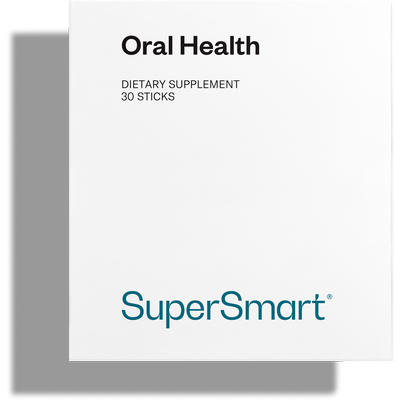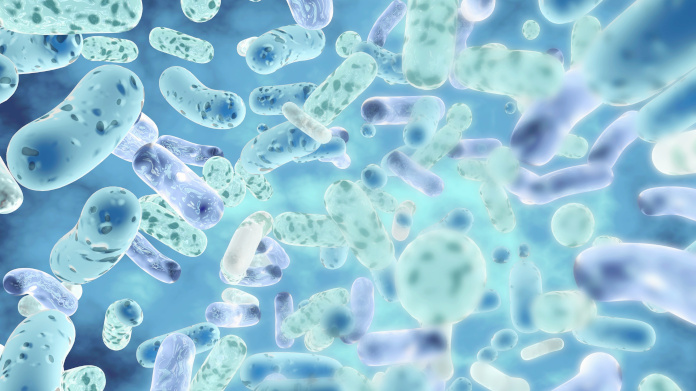
Definition of persistent bad breath or halitosis
Chronic or persistent bad breath is usually referred to by dentists and the wider medical world as halitosis (from the Latin halitus meaning ‘breath’ and the Greek osis meaning ‘disease’). It’s thought to affect between 22% and 50% of the global population.
There are generally several types of odour that characterise bad breath, unpleasant both for the person who has it and for those around them:
- egg;
- cabbage;
- rotten fish;
- rotten apple;
- etc.
Causes of bad breath or halitosis
In 80%-90% of cases, halitosis is of oral origin. Like the gut, the mouth contains billions of bacteria (around 770 different species) which form the oral microbiota.
Some of these bacteria naturally feed on proteins, emitting foul-smelling volatile sulphur compounds (VSC) (1-3). When the oral microbiota becomes unbalanced (referred to as dysbiosis), the overabundance of these bacteria produces an excessive amount of these VSC, which are responsible for persistent bad breath.
As a reminder, simple ‘morning breath’ is usually normal and not pathogenic. Reduced saliva flow during the night causes dryness in the mouth (worse in people who sleep with their mouth open) and thus a temporary accumulation of bacteria.
In halitosis, the following factors are largely responsible for the oral microbiota becoming unbalanced:
- poor oral hygiene which results in dental plaque, a biofilm that covers tooth enamel and on which bacteria proliferate;
- dental caries and abscesses which provide the perfect ‘hiding places’ for bacteria;
- infections fostered by oral disorders such as gingivitis or mouth ulcers;
- faulty dentures which cause bacteria to multiply, etc.
It should also be noted that smoking and alcohol (as well as an overly rich diet) alter the balance of the oral microbiota, potentially promoting halitosis. Combatting chronic bad breath therefore requires, above all, regular dental care and a healthy lifestyle.
Oral probiotics effective for bad breath
Fortunately, the oral microbiota naturally contains other species of bacteria, referred to as probiotic, as they are beneficial for health, in this case oral/dental health.
Their effect on bad breath appears to be related to their ability to inhibit the growth of pathogenic bacteria, to produce antimicrobial substances which reduce dental plaque, etc.
Though lactobacilli represent just 1% of the bacteria in oral flora, a human study of 130 subjects, in which 3790 isolates of lactic bacteria were noted, suggests that Lactobacillus rhamnosus offers significant capacity as an antagonist of key oral pathogens (4).
Another study assessing probiotic efficacy found Lactobacillus salivarius and Lactobacillus reuteri to confer potentially powerful effects against halitosis within less than 4 weeks. Probiotics such as Bifidobacterium longum may also have a role in preventing dental caries (6).
Synergistic probiotic formulations have thus been developed to provide the oral microbiota with billions of ‘friendly’ bacteria (one such product is the probiotic supplement Oral Health, which comes in the form of orodispersible sticks and combines the 4 ‘friendly’ species mentioned above, together with prebiotic fructooligosaccharides to nourish the probiotics).
Chronic bad breath: other possible causes and supplements
Bad breath can also be caused by ENT and respiratory disorders, and in particular, poor digestion, which causes reflux of stomach acid and foul-smelling gases.
If you think your halitosis could have a digestive cause, it may therefore be worth considering - alongside good oral and dental hygiene, a balanced diet and a course of probiotics – remedies such as activated charcoal, which helps to absorb odours and eliminate belching (see Charcoal).
More generally, certain fungi such as Agaricus bisporus have also been studied for their ability to reduce malodorous compounds in the body, in particular, to break down ammonia (a by-product of protein metabolism, levels of which can sometimes be excessive). Agaricus bisporus can be found in supplements specifically targeted at bad breath (such as the famous Champex®).
SUPERSMART ADVICE
References
- HAMPELSKA, Katarzyna, JAWORSKA, Marcelina Maria, BABALSKA, Zuzanna Łucja, et al.The role of oral microbiota in intra-oral halitosis. Journal of clinical medicine, 2020, vol. 9, no 8, p. 2484.
- CHEN, Tsute, YU, Wen-Han, IZARD, Jacques, et al.The Human Oral Microbiome Database: a web accessible resource for investigating oral microbe taxonomic and genomic information. Database, 2010, vol. 2010.
- LAMONT, Richard J., KOO, Hyun, et HAJISHENGALLIS, George. The oral microbiota: dynamic communities and host interactions. Nature reviews microbiology, 2018, vol. 16, no 12, p. 745-759.
- SOOKKHEE, S1, CHULASIRI, M., et PRACHYABRUED, W. Lactic acid bacteria from healthy oral cavity of Thai volunteers: inhibition of oral pathogens. Journal of applied microbiology, 2001, vol. 90, no 2, p. 172-179.
- Huang N, Li J, Qiao X, Wu Y, Liu Y, Wu C, Li L. Efficacy of probiotics in the management of halitosis: a systematic review and meta-analysis. BMJ Open. 2022 Dec 20;12(12):e060753. doi: 10.1136/bmjopen-2022-060753. PMID: 36600415; PMCID: PMC9809225.
- Karbalaei M, Keikha M, Kobyliak NM, Khatib Zadeh Z, Yousefi B, Eslami M. Alleviation of halitosis by use of probiotics and their protective mechanisms in the oral cavity. New Microbes New Infect. 2021 Apr 23;42:100887. doi: 10.1016/j.nmni.2021.100887. PMID: 34123388; PMCID: PMC8173312.
59 Days
Very happy with the order and the…
Very happy with the order and the prompt team's response to an identified issue with my order.
KUQI Fatmir
66 Days
15 + years as a customer
I have been using their products for over 15 years as I find both the quality and pricing excellent.
Del Chandler
67 Days
Good quick delivery
Good quick delivery
Timothy O Shea
68 Days
Good service
Good communication following order. Product came within the time frame and was well packaged. The only confusing thing I found was in checking out. For some reason it is not clear how to do so and the current system should be improved.
Joe O Leary
78 Days
Simple and fast.
Simple and fast.
Nina
78 Days
Great product was definitely what is…
Great product was definitely what is says and arrived on without issue
customer
84 Days
I love reading those product facts on…
I love reading those product facts on Supersmart.com. Effective health products making permanent changes to my blood-work results and testes. However, I also have to order capsules from other websites.
NORDGULEN Olav
87 Days
Great products
Great products Very easy to choose, to order… and to get at home
Federica mastrojanni
90 Days
Service rapide et bons produits
Service rapide et bons produits
customer
91 Days
Good products and fast delivery
Good products and fast delivery
Trusted
96 Days
Does what it says on the can
I believe in this product Made to highest standard The ordering process is straightforward Delivery time prompt Excellent product, excellent service Happy customer ❤️
Sheba Kelleher
101 Days
Excellents produits
Excellents produits. Rien à dire si ce n'est qu'ils sont très chèrs.
MJS_France
103 Days
Very good supplement
Very good supplement
Glaveash
104 Days
Supersmart supplements are really…effective
Supersmart supplements are really effective and have helped me and family members and friends to improve their health including some of us with severe health problems including some with no existing medical treatment.
Anne Georget
105 Days
SuperBig Supersmart
SuperBig Supersmart
Pierre





